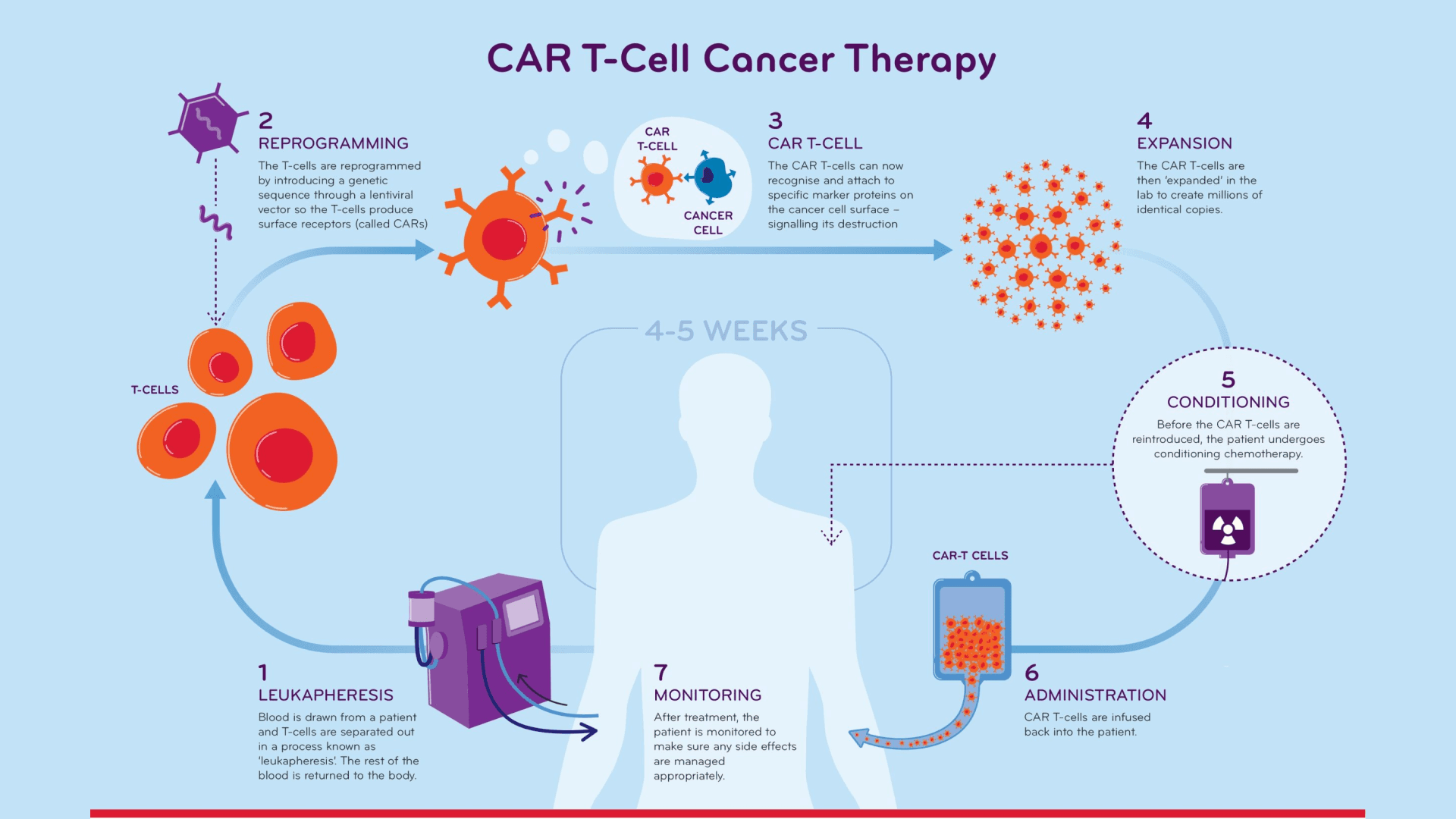Doctors at AIIMS, Delhi, are pioneering a low-cost antibody-based adaptive cellular therapy for multiple myeloma, a form of blood cancer. This breakthrough aims to make advanced therapies like CAR-T cell therapy more affordable and accessible for Indian patients, addressing a critical gap in the treatment of cancer in India. With promising results in animal models, this innovation brings hope to millions battling cancer.
What is CAR-T Cell Therapy? Chimeric Antigen Receptor (CAR) T-cell therapy is a type of adaptive cellular therapy that uses a patient’s immune cells to fight cancer.
How it works:
T-Cell Isolation: The patient’s T cells, a type of immune cell, are extracted.
Genetic Modification: These T cells are genetically engineered to produce receptors that target specific cancer cells.
Reinfusion: The modified cells are infused back into the patient to recognize and kill cancer cells.
At AIIMS, the therapy targets B-cell maturation antigen (BCMA), which is specific to multiple myeloma cancer cells. By recognizing BCMA as a target, the therapy eliminates the cancer cells effectively.

Why CAR-T Therapy for Multiple Myeloma? Multiple Myeloma affects plasma cells, which produce antibodies. When cancerous, these cells multiply rapidly, crowding out normal blood cells.
Limitations of Traditional Treatments:
Severe Side Effects: Chemo and radiotherapy target all rapidly dividing cells, damaging healthy cells.
Relapse Risk: Cancer cells often develop resistance, leading to relapses. Benefits of CAR-T Therapy
Precision Targeting: Focuses on specific antigens like BCMA to kill cancerous cells only.
Fewer Side Effects: Reduces harm to healthy cells.
Improved Survival Rates: Global studies show significant success in prolonging life.
The AIIMS Initiative: Low-Cost CAR-T Therapy Developing CAR-T therapy in India has been challenging due to the high costs associated with imported treatments.
AIIMS’ initiative aims to:
Lower Costs: Make this advanced therapy accessible to the Indian population by significantly reducing its price.
Patent Development: AIIMS researchers have filed for patents on their antibody and CAR-T therapy to ensure innovation is protected while fostering local development.
Phase-1 Trials: Following promising results in animal models, the team plans to begin human clinical trials to evaluate safety and efficacy.
The Need for Affordable Cancer Therapies in India
Alarming Cancer Statistics:
Estimated cancer cases in India in 2022: 14,61,427.
One in nine Indians is likely to develop cancer in their lifetime.
Delayed diagnosis and limited access to advanced therapies exacerbate the burden.
Cost Barrier Current immunotherapies, including CAR-T therapy, are prohibitively expensive, making them inaccessible to most patients in India.

Health Burden With cancer cases projected to rise exponentially, affordable and effective therapies are essential to reducing the healthcare burden in India.
Advancements in Cancer Treatment at AIIMS AIIMS researchers are leveraging antibody-based therapies to develop innovative cancer treatments, including:
Targeted Drug Delivery: Using monoclonal antibodies to deliver chemotherapeutic drugs directly to cancer cells, reducing side effects.
Immunotherapy Innovations: Harnessing the immune system to fight cancer, including cellular therapies like CAR-T.
Patent-Backed Research: Filing patents for innovations ensures scalability and accessibility in India.
The Future of CAR-T Therapy in India Making CAR-T Accessible AIIMS’ low-cost CAR-T therapy is set to revolutionise cancer care in India by:
Reducing Treatment Costs: Making immunotherapy affordable for more patients.
Encouraging Local Manufacturing: Reducing dependence on imported therapies.
Promoting Early Diagnosis: Raising awareness to ensure timely treatment.
Overcoming Challenges : While CAR-T therapy holds immense promise, challenges such as infrastructure, skilled workforce, and regulatory frameworks must be addressed to scale its use effectively.
Hope for Cancer Patients in India: The development of low-cost adaptive cellular therapy by AIIMS is a monumental step toward equitable cancer care in India. By making advanced treatments like CAR-T therapy affordable, this initiative bridges the gap between cutting-edge science and accessibility.
As India tackles the growing cancer burden, innovations like these not only improve patient outcomes but also reaffirm the country’s commitment to advancing healthcare for all. With promising results and a focus on affordability, AIIMS’ research marks a new era in cancer treatment, offering hope to countless lives.



